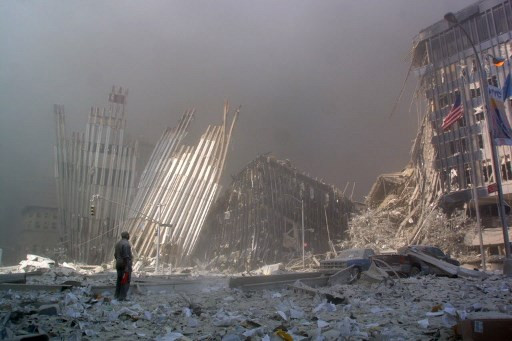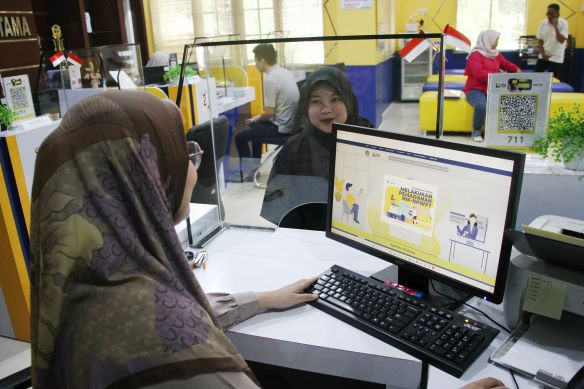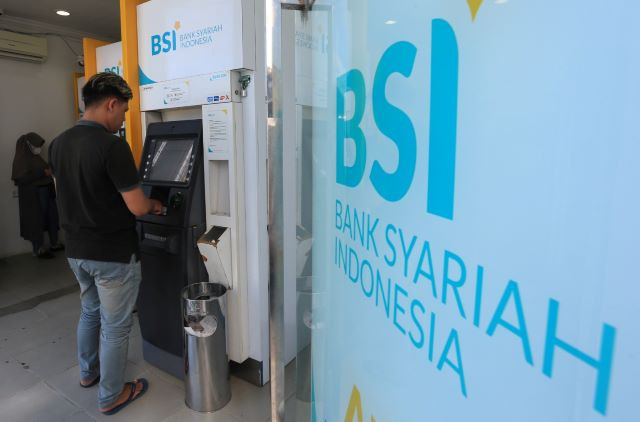Remembering the 9/11 tragedy and terrorist attacks on Indonesia
Many terrorists kill for almost no reason, just because of hatred or simply because they think they have the right to kill anyone they want and their religion allows them to do so.
Change Size
 A man stands in rubble and calls out to ask if anyone needs help, after the collapse of the first World Trade Center Tower in New York City on Sept. 11, 2001. The United States is observing the 20th anniversary of the 9/11 attacks.
(AFP/Doug Kanter)
A man stands in rubble and calls out to ask if anyone needs help, after the collapse of the first World Trade Center Tower in New York City on Sept. 11, 2001. The United States is observing the 20th anniversary of the 9/11 attacks.
(AFP/Doug Kanter)
W
hen terrorists attacked the World Trade Center in New York and the Pentagon on Sept. 11, 2001, there was a common perception in Indonesia, and in many parts of the world, that the barbaric acts of terror should be blamed on the United States itself. The world’s superpower was deemed as the primary cause of the carnage due to its massive anti-Islam campaign.
Indonesian leaders at that time were reluctant to challenge such a narrative, partly because they wanted to play it safe.
Many in the world’s most populous Muslim nation did not realize that the country had produced homegrown terrorists itself. One year after the 9/11 tragedy, terrorists bombed Bali. Only then did we admit we also had own our problems, although many of us remained in self-denial mode and believed the Bali blasts were orchestrated by western countries to weaken Indonesia.
Many others insisted the terrorist attacks were part of a global campaign to tarnish the good name of Islam. Of course, Islam does not tolerate violence and, like other religions, sends the message of peace, but a small group of Muslims have hijacked the religion and claimed to be the true representatives of Islam.
Just two days after the 9/11 attacks, I was assigned to interview an international affairs expert who had deep knowledge of American politics. The basic question in my mind was how the tragedy could happen and what lesson could be learned from the acts of terror.
I chose Dewi Fortuna Anwar of the Indonesian Institute of Sciences (LIPI) because she was sharp and smart, and had frequently written columns in international newspapers and journals. She was known as a moderate Muslim too.
The interview was published on the front page of this paper on Sept. 14, 2001. “The attack should give the US reasons to reflect on why such attacks have been perpetrated, which may lead to recognition that maybe some US policies have resulted in a lot of enemies for the US, not because people are jealous of the US' power but because the US has been unfair,” Dewi said when I asked her what could be the strongest motive behind the terrorist attacks on the US.
Many people, not just Americans but also people of various nationalities, including Indonesians, were angry with the interview. Many, however, shared Dewi’s views, saying she reflected the public sentiment at that time.
Only years later did we realize the root cause of terrorism is not that simple. Many terrorists kill for almost no reason, just because of hatred or simply because they think they have the right to kill anyone they want and their religion allows them to do so.
I realized then that people were irritated by the interview not only because of its substance, but more as a result of the poor timing. We were insensitive to the victims of the terrorist attacks. Thousands were killed, thousands others wounded and thousands lost their loved ones. People were still mourning and in shock after the devastating attacks. American people needed comfort from their friends.
Over a week after 9/11, then-Indonesian president Megawati Soekarnoputri visited then-US president George W. Bush at the White House on Sept. 19. It was a long overdue invitation and a great opportunity for the two countries to deepen their relations. As the leader of the world’s largest predominantly Muslim nation, Megawati was expected to condemn the terrorists who abused Islam to justify their evil acts. However, she was extra cautious, not because she did not sympathize with American people, but because her political foes at home, especially from the Islamic parties, were closely watching her.
Their joint statement, as issued by the White House, said president Megawati “condemned the barbaric and indiscriminate acts carried out against innocent civilians and pledged to cooperate with the international community in combating terrorism. She underscored that terrorism also increasingly threatens Indonesia’s democracy and national security”.
One year later, Indonesia had to openly admit the horrifying fact that terrorism was indeed present and posed a danger to the country.
The Jamaah Islamiyah terrorists detonated bombs on the tourist island of Bali on the evening of Oct. 12, 2002, killing 202 people of 22 nationalities, including 88 Australians, 38 Indonesians, 23 from the United Kingdom, and seven from the US. Many of the foreigners had gone to Bali to witness the beauty of Indonesia, but a group of people who claimed to have a license to kill from God committed the act of savagery.
The Bali 1 bombing marked a start to Indonesia’s own war on terror. The National Police received huge financial assistance from foreign countries to modernize its counterterrorism squad with the most sophisticated technology and knowledge.
This time Indonesian politicians had little excuse to blame other nations for the terror. While in 2001 they blamed the US and condemned the Islamophobia, following the Bali attacks they had to acknowledge something wrong was happening in this country. This was evident as in the next few years terrorists continued to launch attacks.
In August 2003, they bombed the JW Marriott Hotel in South Jakarta. In September 2004 they attacked the Australian Embassy in Jakarta. In 2005 they bombed Bali for the second time, and in 2009 they blasted the Marriott Hotel again as well as the neighboring Ritz Carlton Hotel. The full list of their targets and victims is too long to be written here.
In commenting on the 2002 Bali bombing, then-US secretary of state Colin Powell reminded Indonesia of its reluctance to acknowledge its own problems with terrorism.
“So we now can see that you are not exempt from this; you cannot pretend it doesn't exist in your country. It exists everywhere where conditions are right and where this kind of terrorist organization can thrive,” the Washington Post quoted Powell as saying in its Oct. 16, 2002 edition.
Today we pray for victims of the 9/11 tragedy and all who perished in acts of terror all over the world. They are innocent victims. Terrorists are almost everywhere, using any pretext to justify their evil acts. Should we deny this fact?
***
The writer is a senior editor of The Jakarta Post.









